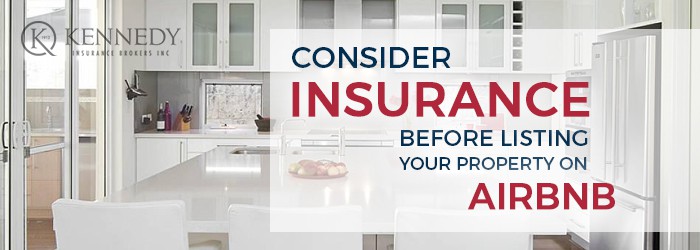Short-term rental websites like AirBnB seem like a great option if you have a second property sitting vacant or are going away and want to make some extra money renting out your place while you are gone. Since North Bay, Callander and surrounding areas have such an abundance of waterfront and summer activities, there are usually people looking for short-term rentals in the area. But there are insurance and legal implications to consider before you hit the “submit” button on your listing.
Regular Homeowner’s Policy Does not Cover Rentals
A home insurance policy is meant to cover the activities of the homeowner themselves and offer liability coverage for guests. Once a “guest” starts paying to stay, they are considered to be a renter and you need to change your insurance policy to allow for such activities. The same holds true if you rent a room to a student. Once you start charging for access to your property, this is considered a material change in risk and the terms of your policy have to change.
John Kidder, an Ontario man who was listing his property through AirBnB, deleted his listing when his insurance broker told him that he was in danger of having his homeowner’s policy cancelled if he left his listing up. Kidder would have had to change his policy to allow for AirBnB rentals.
Advise Your Insurance Company about AirBnB rentals
An AirBnB rental carries more risks than typical rental arrangements. Insurance companies are concerned about damage caused by a tenant, theft, vandalism and other risks that may be associated with roomers and boarders using your property. As a result, you likely have update or switch coverage entirely in order to cover AirBnB or other short-term rentals, depending on how you are renting your property. It may be more expensive but it is best to ensure your insurer knows you are renting your property to make sure you are properly covered.
The same insurance considerations generally apply to renting out a cottage or seasonal property – contact your broker to make sure you have the right coverage, as your policy may not cover rental activity.
Just make sure you speak with your insurance provider to make sure you are properly protected.
Special considerations for Condo owners and Renters subletting on AirBnB
If you are a renter and you are subletting your property on AirBnB for more than 11 nights a year, you could be in violation of the Ontario Residential Tenancies Act. If you own a condominium property, short-term rentals may violate your condo board’s policies, so best check first.
What about the AirBnB Host Guarantee?
The AirBnB Host Guarantee promises up to $900,000 for damages to property. However, it is not insurance and payment of any damage claims under the Guarantee is subject to an investigation on the part of AirBnB. In addition, you need to go through a dispute resolution process with the offending guest prior to submitting for damages.
As a result, you are shouldering costs of damages until the investigations on the part of AirBnB are concluded; if you have proper insurance coverage to cover your short-term rental, you are generally compensated for damages quickly in the event of a claim. Your broker will also help you with the paperwork, where applying for the AirBnB Host Guarantee puts all the work on your desk.
Please make sure you take all these considerations into account, and make sure you are properly protected, before listing on AirBnB!
If you want to know more about coverage for your AirBnB or rental property, contact Kennedy Insurance and talk to one of our brokers. We’ll make sure you get the coverage you need.
